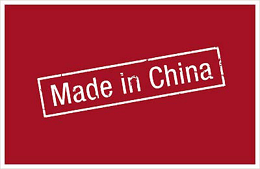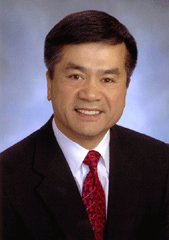The China Challenge
Air Date: Week of July 24, 2009

A coal-burning concrete plant near the Yangtze River. China as a whole is now the world’s biggest emitter, but U.S. per capita emissions are five times those of the Chinese. (Photo: David Dewey)
Among the developing countries reluctant to reduce greenhouse gas emission before developed countries make progress, China is the economic powerhouse. U.S. labor and industry groups worry capping emissions at home while China goes about its business as usual will put the United States at a competitive disadvantage. Commerce Secretary Gary Locke just returned from China. He tells host Jeff Young when it comes to climate change and trade with China, there are just as many opportunities as there are challenges.
Transcript
YOUNG: Now Secretary Clinton wasn’t the only cabinet member in Asia. Commerce Secretary Gary Locke, the first Chinese-American to hold that post, joined energy Secretary Stephen Chu on a week-long tour of green technology sites in China.
And Secretary Locke is on the line with us now, thanks for joining us.
LOCKE: My pleasure Jeff.
YOUNG: I want to hear about this trip to China. You know we hear some many mixed signals on where China is headed with energy. We hear they’re racing ahead on clean energy investment. Oh no, they’re building a dirty coal power plant every week. Well, which is it?

Solar panels in Kunming. China wants a fifth of its energy demand to come from renewables by 2020. (Photo: Matthijs Koster)
YOUNG: Now one thing you emphasized on the trip was the importance of sharing energy technology. How does that benefit China? How does that benefit the U.S?
LOCKE: Well clearly there are great opportunities for collaboration. Secretary Chu and the Chinese were able to announce a joint scientific endeavor in which both countries will contribute about $7.5 million each to create a joint research center. This is an opportunity where the intellectual property would be owned by both and therefore we could share it with the whole world in fact.
And we visited quite a few places that show the incredible potential of clean energy technologies. And interestingly enough two of those featured American made products. There’s a U.S. company that’s producing the most advanced clean burning diesel bus engines. In fact, they’re working on technology where the air coming out at the end of the tailpipe will actually be cleaner than the air going into the engine. So these are examples of win-win opportunities.
YOUNG: Now I know some U.S. business interests have expressed some concern about sharing technology, energy technology, around this area of intellectual property rights and, you know, keeping our competitive energy. How do we remain the leaders in clean energy technology if we’re sharing this with our chief competitors?
LOCKE: Well that’s why it’s very, very important that we also pursue intellectual property rights protections and make sure that U.S. companies are able to sell their products and services in China and that whatever technologies they introduce into China is not copied and ripped off. Progress is being made of course the U.S. believe that more progress must be made and faster. But we simply can not wait for the Chinese to develop their own domestic industries on alternative energy cause every year that we wait, it makes it even harder to reverse the effects of climate change.
YOUNG: Do these concerns about getting the clean energy in time to meet the climate challenge trump concerns about intellectual property rights and competitiveness?
LOCKE: I don’t see those as mutually exclusive. The Chinese leaders have indicated that they are willing to pay for the technology. They’d like us to share more. There is just so much to be done. And U.S. companies are saying that they’re able to sell their technology. They’d like to sell more of course. And we need to fight protectionism within China that might favor domestic companies. That is the biggest hurdle that American companies face. It’s the fact that they’re being shut out from some of these bidding opportunities to build a clean power plant. And that the Chinese might be favoring just Chinese companies.
YOUNG: Now, a pretty big chunk of China’s emissions come from the manufacture of goods that primarily we buy here in the U.S.

About a third of China’s heat-trapping gases come from export production for Western countries.
LOCKE: Well, first of all the Chinese certainly have the funds to help those companies clean up their act and I‘ve always believe that quite frankly – because we embrace these environmental standards along w with health and human safety standards and worker’s rights and labor standards. It really puts American companies at a competitive disadvantage because those goods can be produced at a cheaper cost which makes buying those goods much more attractive than goods made in America.
YOUNG: But do we bear no responsibility for our consumption? I men, we are the ones a lot of those goods that the Chinese manufacture simply for export.
LOCKE: Well that’s why I think out trade agreements need to incorporate these basic minimum standards of human rights, health and safety standards, environmental regulations and I believe that they should incorporate standards that address climate change as well.
YOUNG: You’re the first Chinese-American to be our secretary of commerce and you’re traveling partner on this trip to China, Steven Chu, also Chinese-American. I’ve wondering how did that affect your reception there in China and your ability to build relationships with the Chinese?

Commerce Secretary Gary Locke.
YOUNG: U.S. Commerce Secretary Gary Locke reporting on his recent trip to China. Thank you for your time, Sir.
LOCKE: Well thank you very much Jeff.
YOUNG: Coming up: it might help your garden grow but cypress mulch could be eating away at Louisiana swamps. Keep listening to Living on Earth.
Links
Click here to find out more about clean tech and intellectual property.
Living on Earth wants to hear from you!
Living on Earth
62 Calef Highway, Suite 212
Lee, NH 03861
Telephone: 617-287-4121
E-mail: comments@loe.org
Newsletter [Click here]
Donate to Living on Earth!
Living on Earth is an independent media program and relies entirely on contributions from listeners and institutions supporting public service. Please donate now to preserve an independent environmental voice.
NewsletterLiving on Earth offers a weekly delivery of the show's rundown to your mailbox. Sign up for our newsletter today!
 Sailors For The Sea: Be the change you want to sea.
Sailors For The Sea: Be the change you want to sea.
 The Grantham Foundation for the Protection of the Environment: Committed to protecting and improving the health of the global environment.
The Grantham Foundation for the Protection of the Environment: Committed to protecting and improving the health of the global environment.
 Contribute to Living on Earth and receive, as our gift to you, an archival print of one of Mark Seth Lender's extraordinary wildlife photographs. Follow the link to see Mark's current collection of photographs.
Contribute to Living on Earth and receive, as our gift to you, an archival print of one of Mark Seth Lender's extraordinary wildlife photographs. Follow the link to see Mark's current collection of photographs.
 Buy a signed copy of Mark Seth Lender's book Smeagull the Seagull & support Living on Earth
Buy a signed copy of Mark Seth Lender's book Smeagull the Seagull & support Living on Earth

